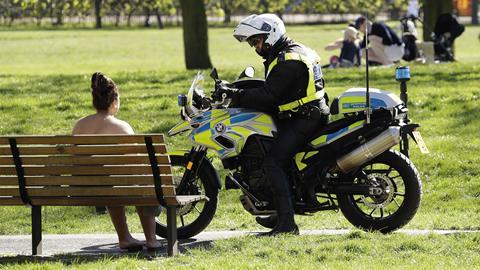A cross-party group of MPs has criticised government communications on new Covid-19 offences for 'blurring the line' between guidance and law in a report identifying lessons to be learned from the use of criminal law during the pandemic.
The House of Commons justice select committee, in today's report, acknowledged that the government was required to act quickly in response to a public health emergency of a scale not seen in recent times. However, the committee said the creation and enforcement of new criminal offences had to be compatible with widely understood principles of the rule of law.
The committee's inquiry found the government’s communication of Covid-19 offences resulted in widespread confusion between law and guidance, with some police forces seeking legal advice on the regulations so they could produce clear guidance for officers.
Confusion was also demonstrated by those responsible for introducing the law. ‘For example, we asked Lord Bethell, the then health minister, whether social distancing was a legal requirement or stipulated in guidance. He told us that “I think it is in the steps regs, which came through in January, and therefore it is in the law. So it is totally unambiguous”. The “steps regulations” referred do not contain any direct reference to social distancing, although they do require the organiser of a permitted organised gathering to take into account government guidance which is relevant to the gathering,’ the report says.
The committee said government communication of new criminal offences must accurately reflect the true legal position so as not to undermine public trust and public compliance.
'We recognise that throughout the pandemic the government’s priority has been to communicate as clearly as possible to the public what they should and should not do. We also recognise that due to the speed with which legislation needed to be passed, and the complexity of the legislative framework, it was difficult always to capture the nuance between what was advisable and what was prohibited by law within government announcements and ministerial press conferences.
‘Blurring the line between government guidance and the law has potentially damaging long-term consequences, including for the rule of law. In a free society that respects the rule of law, only legislation can criminalise conduct, and it should be open to a person to decide whether to follow government guidance. The government has a responsibility to ensure that the public and the police have a clear understanding of the distinction between guidance and the law,’ the report says.
Looking at enforcement of Covid-19 offences, CPS figures covering March 2020 to June 2021 showed that 20% of the 1,920 reviewed since the start of the pandemic were incorrectly charged. National Police Chiefs’ Council figures as of 28 June 2021 show that 117,213 fixed penalty notices have been given out since 27 March 2020 but there has been no external review on how many of these notices were correctly given.
A HM Courts & Tribunals Service review of 5,156 cases dealt under the controversial Single Justice Procedure, including non-Covid cases, between 1 September and 30 October 2020, identified errors in 10% of cases.
The committee said the use of the single justice procedure to deal with Covid offences had been problematic in the wider context of public uncertainty on what was prohibited and what was allowed, caused by the fast-changing nature of regulaions.
As well as reviewing the transparency of the single justice procedure, the committee says its use in Covid-19 cases should be reviewed.




























7 Readers' comments